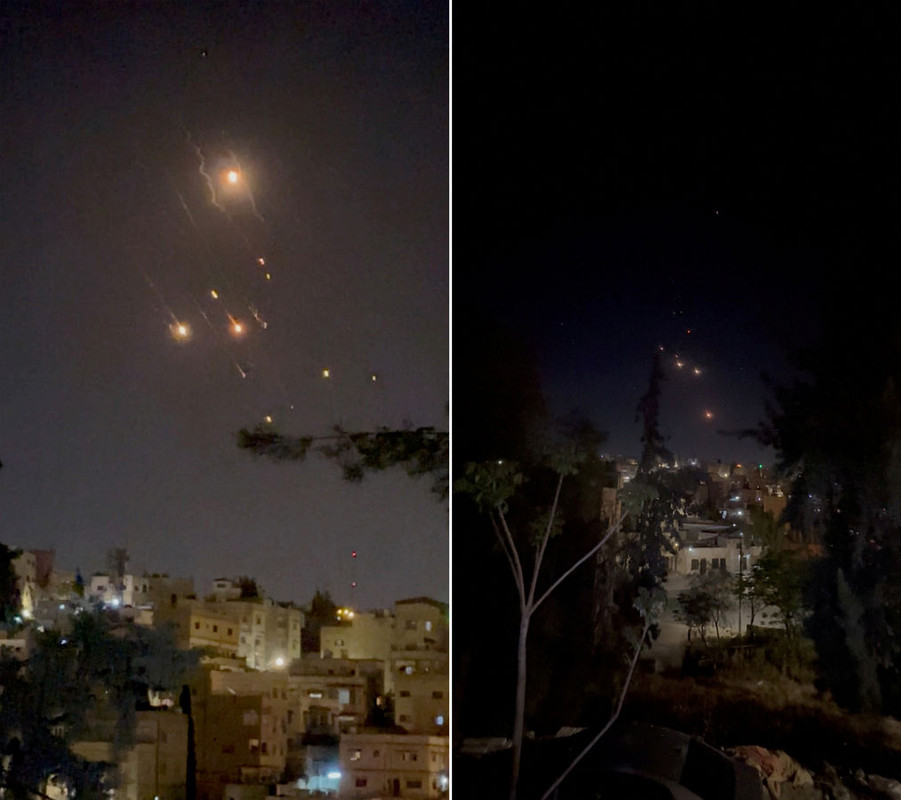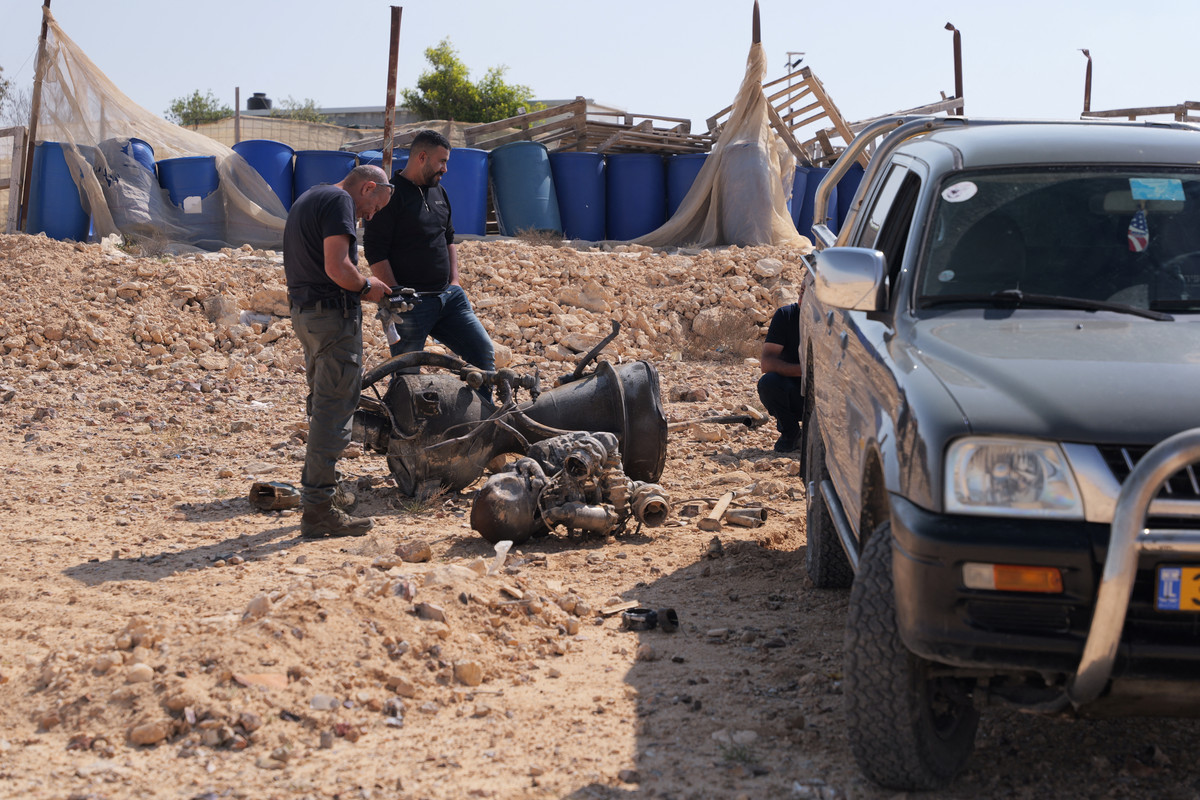US Will Stay Out Of Any Israeli Retaliatory Action Against Iran
Iran said the attack was aimed at punishing "Israeli crimes", but it now "deemed the matter concluded".
President Joe Biden warned Prime Minister Benjamin Netanyahu the US will not take part in a counter-offensive against Iran, an option Netanyahu's war cabinet favours after a mass drone and missile attack on Israeli territory, according to officials
The threat of open warfare erupting between the arch Middle East foes and dragging in the US put the region on edge, triggering calls for restraint from global powers and Arab nations to avoid further escalation.
"The Middle East is on the brink. The people of the region are confronting the real danger of a devastating full-scale conflict. Now is the time to defuse and de-escalate," United Nations Secretary-General Antonio Guterres told a Security Council meeting called on Sunday, 14 April, in response to the strikes.
Deputy US Ambassador to the UN Robert Wood called on the council to unequivocally condemn Iran's attack, as he said Washington would explore additional, unspecified measures at the United Nations to hold Iran accountable and warned against further aggression.
"Let me be clear: If Iran or its proxies take actions against the US or further action against Israel, Iran will be held responsible," he said.
As Washington stressed its desire to avoid escalation, Secretary of State Antony Blinken and Defense Secretary Lloyd Austin spoke to counterparts including in Saudi Arabia, Turkey, Egypt, and Jordan, stressing the need to avoid escalation, the importance of a coordinated diplomatic response, and emphasising that the US will continue to support Israel's defence.
Israeli officials said Netanyahu's five-member war cabinet favoured retaliation in a meeting on Sunday, although the panel was divided over the timing and scale of any such response.
Markets were nervous about the risk of a broader war but calm in early Asia trading, with oil prices lower, gold higher and the dollar holding steady.
Iran launched the attack over a suspected Israeli strike on its embassy compound in Syria on 1 April that killed top Revolutionary Guards commanders and followed months of clashes between Israel and Iran's regional allies, triggered by the war in Gaza.
However, the attack by more than 300 missiles and drones caused only modest damage in Israel. Most were shot down by Israel's Iron Dome defence system and with help from the US, Britain, France, and Jordan.
Objects are seen in the sky over Amman after Iran launched drones towards Israel, in Amman, Jordan, on 14 April, in this screen grab obtained from a social media video.
Image via Social media via ReutersLittle serious damage
The only serious injury reported within Israel was a seven-year-old who was hurt by shrapnel.
There also was little serious property damage reported. Authorities said an Israeli Air Force base was hit but continued to operate as normal.
Two senior Israeli ministers signalled on Sunday that retaliation was not imminent and that Israel would not act alone.
"We will build a regional coalition and exact the price from Iran in the fashion and timing that is right for us," centrist minister Benny Gantz said ahead of a war cabinet meeting.
Defence Minister Yoav Gallant also said Israel had an opportunity to form a strategic alliance "against this grave threat by Iran, which is threatening to mount nuclear explosives on these missiles, which could be an extremely grave threat," he said. Iran denies seeking nuclear weapons.
Gantz and Gallant are Israeli war cabinet members with decision-making powers.
Israel remained on high alert, but authorities lifted some emergency measures that had included a ban on some school activities and caps on large gatherings.
Drone and missile interceptions cost around 4.5 billion shekels (about RM5.7 billion), according to Israel's Channel 13 News, which said Washington funded some of the cost.
Iranian army chief of staff Major General Mohammad Bagheri said on television, "Our response will be much larger than tonight's military action if Israel retaliates against Iran," and told Washington that its bases could also be attacked if it helped Israel retaliate.
Iranian Foreign Minister Hossein Amirabdollahian said Tehran had informed the US its attack on Israel would be limited and for self-defence and that regional neighbours had been informed of its planned strikes 72 hours in advance.
A Turkish diplomatic source said Iran had informed Turkey in advance.
Iran said the attack was aimed at punishing "Israeli crimes", but it now "deemed the matter concluded".
The leaders of the Group of 7 nations condemned Iran's attack and said they would work to stabilise the situation, warning in a statement that Tehran risked "an uncontrollable regional escalation".
A police officer inspects the remains of a rocket booster that, according to Israeli authorities critically injured a seven-year-old girl, after Iran launched drones and missiles towards Israel, near Arad, Israel, 14 April.
Image via Christophe Van der Perre/ReutersMotivations for attack debated
Analysts debated whether Iran's attack was calibrated to cause genuine devastation in Israel, or to save face at home after vows of revenge while avoiding a major new war.
"I think the Iranians took into consideration the fact that Israel has a very, very strong multi-layer anti-missile system and they probably took into consideration that there will not be too many casualties," said Sima Shine, a former senior Mossad official at the Institute for National Security Studies in Tel Aviv.
In Gaza, Iran's attack drew applause as rare payback for an Israeli offensive that has killed at least 33,000 people.
"We have been slaughtered for over six months and no one dared to do anything. Now Iran, after its consulate was hit, is hitting back at Israel and this brings joy into our hearts," said Majed Abu Hamza of Gaza City.
The war in Gaza, which Israel invaded after an attack by Iran-backed Hamas on 7 October 2023, has spread to fronts with Iran-aligned groups in Lebanon, Syria, Yemen, and Iraq.
Netanyahu has long advocated a tough military line against Iran, pushing Washington for harder action over Tehran's nuclear programme and its backing for militant groups in the region.
In Israel, although there was alarm at the first direct attack from another country in more than three decades, the mood contrasted with the trauma after the Hamas-led attack on 7 October 2023.
"I think we've been given license to respond now. I mean it was a major attack from Iran... I imagine Israel will respond and may be over quickly and get back to normal life," said Jeremy Smith, 60.
In Iran, state television showed small gatherings in several cities celebrating the attack, but in private, some Iranians were worried about Israel's response.
"Iran gave Netanyahu a golden opportunity to attack our country. But we, the people of Iran, will bear the brunt of this conflict," said Shima, a nurse, from Tehran.
Iranian demonstrators react after the Islamic Revolutionary Guard Corps attack on Israel, during an anti-Israeli gathering in front of the British Embassy in Tehran, Iran, on 14 April.
Image via Reuters

